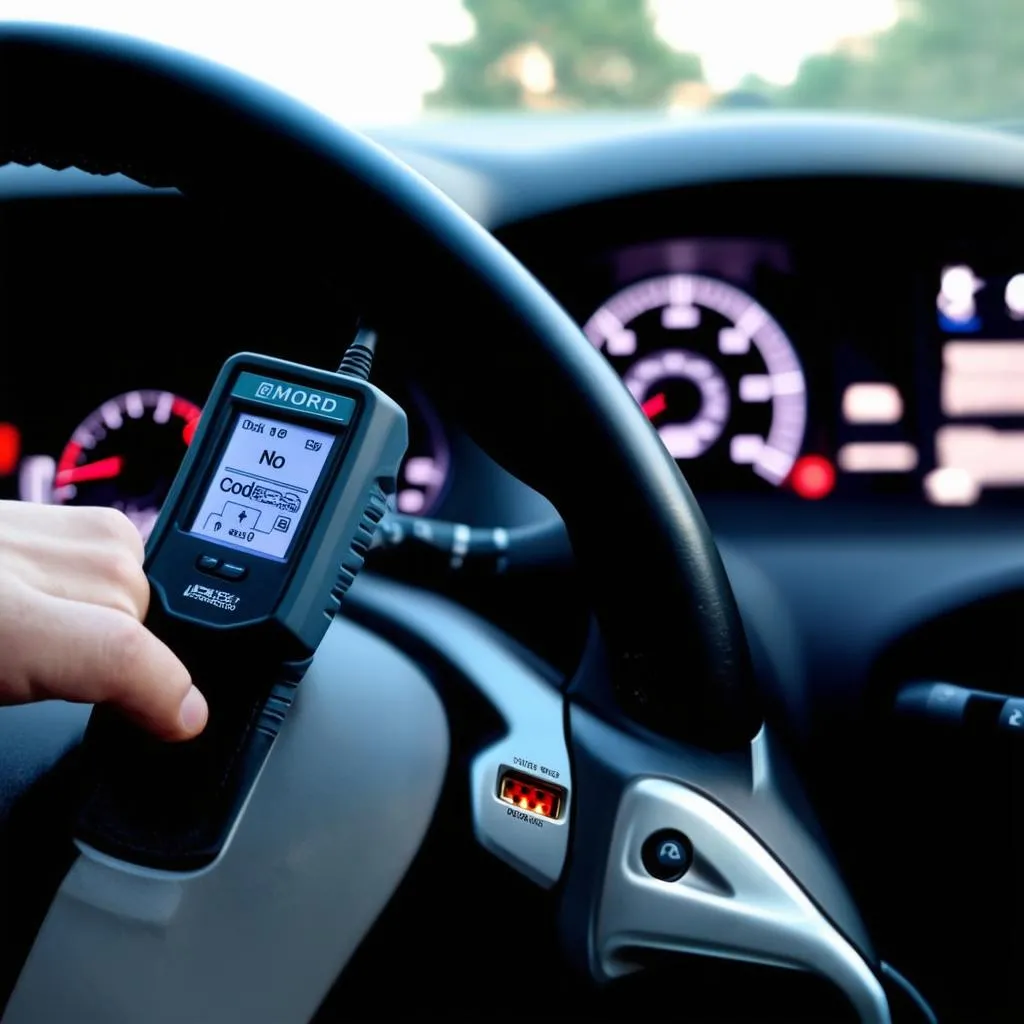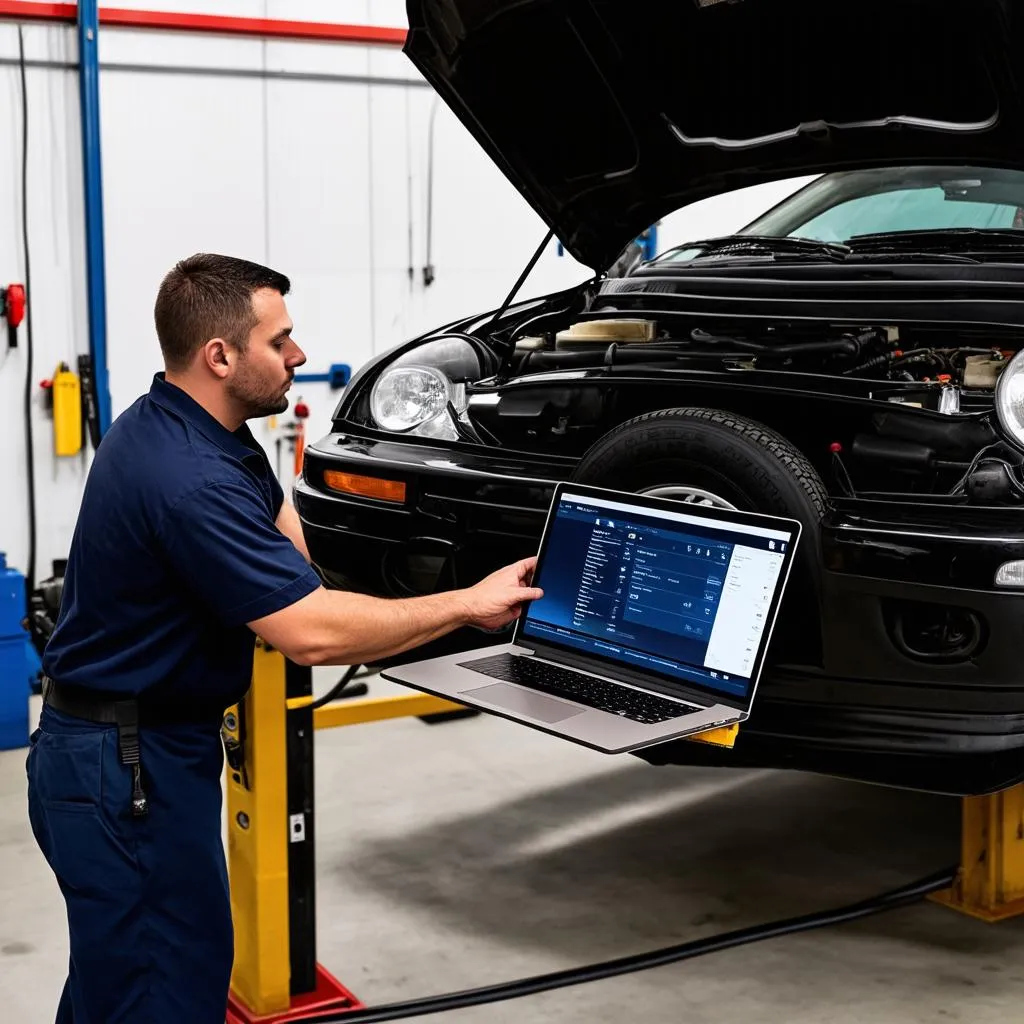“My check engine light is on, but the OBD scanner isn’t showing any codes!” Sound familiar? This frustrating scenario has left many car owners scratching their heads.
Let’s dive into the world of OBD scanners, those handy devices that act like a window into your car’s brain, and figure out why you might be facing the dreaded “Obd Not Reading Codes” issue.
Understanding the Silence: What Does “Obd Not Reading Codes” Really Mean?
Before we jump into solutions, let’s establish a clear picture of the problem. When we say “OBD not reading codes,” we’re talking about a situation where you connect your trusty OBD scanner to your car’s OBD-II port (usually found under the driver’s side dash), but the scanner fails to retrieve any Diagnostic Trouble Codes (DTCs). It’s like trying to listen in on a conversation, but the line is dead.
Why is This Happening? Exploring the Potential Culprits
Several factors can cause your OBD scanner to go silent. Let’s break down some of the most common reasons:
1. A Blown Fuse: The Unsung Hero of Electrical Circuits
Imagine a fuse as a bodyguard for your car’s electrical system. When there’s a surge of power, the fuse sacrifices itself to protect more sensitive components. A blown fuse linked to your OBD-II port could be the reason your scanner is left in the dark.
- Think back: Have you done any recent electrical work on your car? A blown fuse might be the unintended consequence.
2. Loose or Damaged Connections: The Importance of a Solid Grip
Just like a weak handshake can leave a bad impression, a loose or damaged connection between your OBD scanner, the OBD-II port, or the wiring in between can disrupt communication, resulting in a “no code” reading.
- Pro Tip: Give your OBD-II port a visual inspection. Are there any bent or corroded pins? Sometimes a little cleaning with electrical contact cleaner can work wonders.
3. The OBD Scanner Itself: Is it Time for a Check-Up?
Sometimes the problem isn’t your car, but the tool itself. A faulty OBD scanner can lead to inaccurate or nonexistent readings.
- Try this: If possible, connect your scanner to another vehicle. If it works on a different car, the issue likely lies within your vehicle’s systems.
4. Deeper Issues: When Your Car Needs a Specialist
In some cases, the culprit behind the silent OBD scanner might be a more complex electrical problem, such as a faulty ECU (Engine Control Unit) – your car’s central computer. This is where things can get a bit more technical, and consulting a qualified mechanic becomes crucial.
- Red Flag: If you’ve checked the basics and are still facing the issue, don’t hesitate to seek professional help.
 OBD Scanner Connected
OBD Scanner Connected
Decoding the Dilemma: Common Questions About OBD Scanners Not Reading Codes
Q: Can a dead car battery cause OBD reading problems?
A: Absolutely! Your car’s battery plays a vital role in powering the OBD-II system. A dead or weak battery can disrupt communication, making your scanner think there are no codes to read.
Q: My OBD scanner worked before, but now it’s not. What changed?
A: This suggests a recent change within your car’s systems. Consider any recent repairs, modifications, or even a simple incident like accidentally leaving your car lights on, which could have drained the battery.
Q: Do I need a special OBD scanner for my European car?
A: While a standard OBD-II scanner will work for basic code reading on most European cars, some models, especially older ones or those with specialized systems, may require a scanner specifically designed for European makes. For instance, if you are having trouble with your Lexus or Volkswagen, you might need a specialized Dealer Scanner for European cars.
- Insider Tip: You can find resources and recommended scanners tailored for specific European car models on websites like techcarusa.com. For example, you can find information about OBD ports on specific car models, such as the 2019 Tiguan OBD port or the 06 Volkswagen Passat OBD location. You can also find information on specialized tools, such as the Auto OBD II Diagnostic Angled Connector.
 Car Diagnostic Check
Car Diagnostic Check
Beyond the Codes: A Holistic Approach to Car Care
While OBD scanners are powerful tools for diagnosing car problems, remember that they are just one piece of the puzzle.
Here are some additional tips for keeping your car in tip-top shape:
- Regular Maintenance is Key: Just like our bodies thrive on routine check-ups, our cars benefit from regular maintenance. Stick to your car’s recommended service schedule to catch potential issues before they escalate.
- Listen to Your Car: Your car often communicates through subtle signs. Pay attention to any unusual noises, vibrations, or warning lights on your dashboard. Early detection can save you headaches (and potentially costly repairs) down the road.
- Choose Your Mechanic Wisely: Finding a trustworthy and knowledgeable mechanic is like finding a reliable doctor for your car. Don’t be afraid to ask for recommendations or read reviews. A good mechanic can be your car’s best friend.
Need a Helping Hand? We’re Just a Message Away!
We understand that dealing with car troubles can be stressful. That’s why we’re here to help! If you need assistance with installing diagnostic software or require expert advice on car repairs, don’t hesitate to contact us via WhatsApp at +84767531508. Our team of automotive specialists is available 24/7 to guide you through any challenges.
Remember: Your car is a complex machine, and it’s okay to ask for help when you need it.
Explore Further:
- Troubleshooting Engine Codes on a 2006 Lexus IS250
- Understanding OBD Ports: A Guide to Your Car’s Diagnostic System
We hope this comprehensive guide has shed some light on the often-puzzling world of OBD scanners and provided you with the knowledge to tackle “OBD not reading codes” issues. Safe driving!